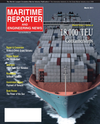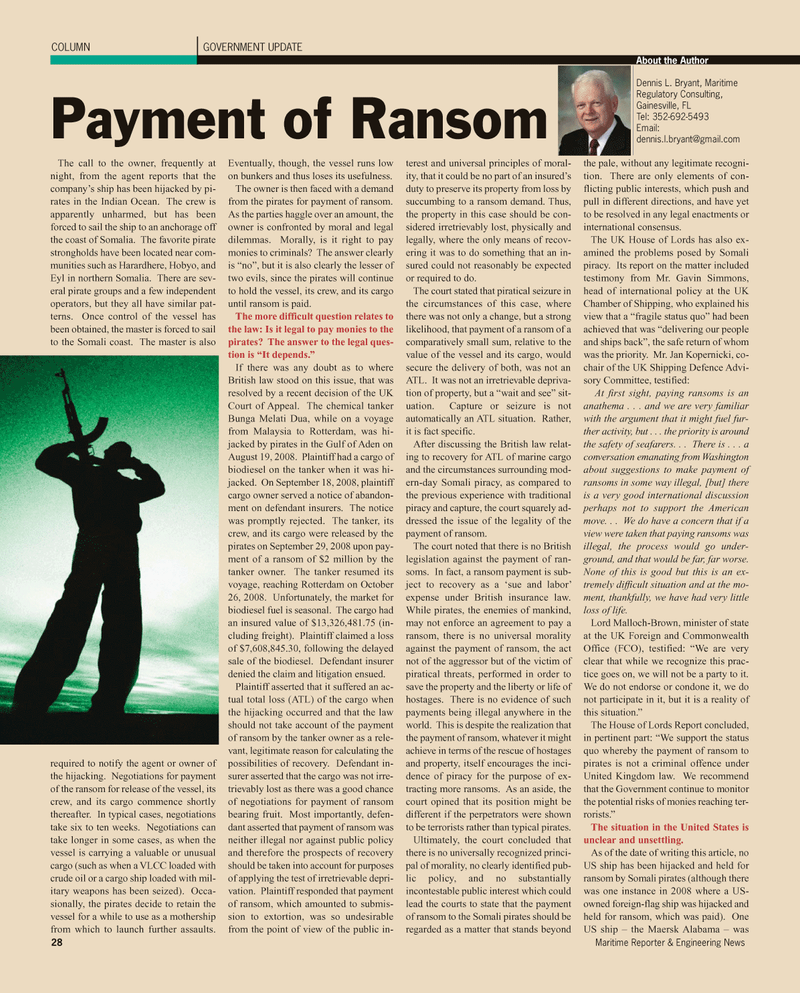
Page 28: of Maritime Reporter Magazine (March 2011)
Ship Repair & Conversion
Read this page in Pdf, Flash or Html5 edition of March 2011 Maritime Reporter Magazine
28 Maritime Reporter & Engineering News
COLUMN GOVERNMENT UPDATE
Payment of Ransom
About the Author
Dennis L. Bryant, Maritime
Regulatory Consulting,
Gainesville, FL
Tel: 352-692-5493
Email: [email protected]
The call to the owner, frequently at night, from the agent reports that the company’s ship has been hijacked by pi- rates in the Indian Ocean. The crew is apparently unharmed, but has been forced to sail the ship to an anchorage off the coast of Somalia. The favorite pirate strongholds have been located near com- munities such as Harardhere, Hobyo, and
Eyl in northern Somalia. There are sev- eral pirate groups and a few independent operators, but they all have similar pat- terns. Once control of the vessel has been obtained, the master is forced to sail to the Somali coast. The master is also required to notify the agent or owner of the hijacking. Negotiations for payment of the ransom for release of the vessel, its crew, and its cargo commence shortly thereafter. In typical cases, negotiations take six to ten weeks. Negotiations can take longer in some cases, as when the vessel is carrying a valuable or unusual cargo (such as when a VLCC loaded with crude oil or a cargo ship loaded with mil- itary weapons has been seized). Occa- sionally, the pirates decide to retain the vessel for a while to use as a mothership from which to launch further assaults.
Eventually, though, the vessel runs low on bunkers and thus loses its usefulness.
The owner is then faced with a demand from the pirates for payment of ransom.
As the parties haggle over an amount, the owner is confronted by moral and legal dilemmas. Morally, is it right to pay monies to criminals? The answer clearly is “no”, but it is also clearly the lesser of two evils, since the pirates will continue to hold the vessel, its crew, and its cargo until ransom is paid.
The more difficult question relates to the law: Is it legal to pay monies to the pirates? The answer to the legal ques- tion is “It depends.”
If there was any doubt as to where
British law stood on this issue, that was resolved by a recent decision of the UK
Court of Appeal. The chemical tanker
Bunga Melati Dua, while on a voyage from Malaysia to Rotterdam, was hi- jacked by pirates in the Gulf of Aden on
August 19, 2008. Plaintiff had a cargo of biodiesel on the tanker when it was hi- jacked. On September 18, 2008, plaintiff cargo owner served a notice of abandon- ment on defendant insurers. The notice was promptly rejected. The tanker, its crew, and its cargo were released by the pirates on September 29, 2008 upon pay- ment of a ransom of $2 million by the tanker owner. The tanker resumed its voyage, reaching Rotterdam on October 26, 2008. Unfortunately, the market for biodiesel fuel is seasonal. The cargo had an insured value of $13,326,481.75 (in- cluding freight). Plaintiff claimed a loss of $7,608,845.30, following the delayed sale of the biodiesel. Defendant insurer denied the claim and litigation ensued.
Plaintiff asserted that it suffered an ac- tual total loss (ATL) of the cargo when the hijacking occurred and that the law should not take account of the payment of ransom by the tanker owner as a rele- vant, legitimate reason for calculating the possibilities of recovery. Defendant in- surer asserted that the cargo was not irre- trievably lost as there was a good chance of negotiations for payment of ransom bearing fruit. Most importantly, defen- dant asserted that payment of ransom was neither illegal nor against public policy and therefore the prospects of recovery should be taken into account for purposes of applying the test of irretrievable depri- vation. Plaintiff responded that payment of ransom, which amounted to submis- sion to extortion, was so undesirable from the point of view of the public in- terest and universal principles of moral- ity, that it could be no part of an insured’s duty to preserve its property from loss by succumbing to a ransom demand. Thus, the property in this case should be con- sidered irretrievably lost, physically and legally, where the only means of recov- ering it was to do something that an in- sured could not reasonably be expected or required to do.
The court stated that piratical seizure in the circumstances of this case, where there was not only a change, but a strong likelihood, that payment of a ransom of a comparatively small sum, relative to the value of the vessel and its cargo, would secure the delivery of both, was not an
ATL. It was not an irretrievable depriva- tion of property, but a “wait and see” sit- uation. Capture or seizure is not automatically an ATL situation. Rather, it is fact specific.
After discussing the British law relat- ing to recovery for ATL of marine cargo and the circumstances surrounding mod- ern-day Somali piracy, as compared to the previous experience with traditional piracy and capture, the court squarely ad- dressed the issue of the legality of the payment of ransom.
The court noted that there is no British legislation against the payment of ran- soms. In fact, a ransom payment is sub- ject to recovery as a ‘sue and labor’ expense under British insurance law.
While pirates, the enemies of mankind, may not enforce an agreement to pay a ransom, there is no universal morality against the payment of ransom, the act not of the aggressor but of the victim of piratical threats, performed in order to save the property and the liberty or life of hostages. There is no evidence of such payments being illegal anywhere in the world. This is despite the realization that the payment of ransom, whatever it might achieve in terms of the rescue of hostages and property, itself encourages the inci- dence of piracy for the purpose of ex- tracting more ransoms. As an aside, the court opined that its position might be different if the perpetrators were shown to be terrorists rather than typical pirates.
Ultimately, the court concluded that there is no universally recognized princi- pal of morality, no clearly identified pub- lic policy, and no substantially incontestable public interest which could lead the courts to state that the payment of ransom to the Somali pirates should be regarded as a matter that stands beyond the pale, without any legitimate recogni- tion. There are only elements of con- flicting public interests, which push and pull in different directions, and have yet to be resolved in any legal enactments or international consensus.
The UK House of Lords has also ex- amined the problems posed by Somali piracy. Its report on the matter included testimony from Mr. Gavin Simmons, head of international policy at the UK
Chamber of Shipping, who explained his view that a “fragile status quo” had been achieved that was “delivering our people and ships back”, the safe return of whom was the priority. Mr. Jan Kopernicki, co- chair of the UK Shipping Defence Advi- sory Committee, testified:
At first sight, paying ransoms is an anathema . . . and we are very familiar with the argument that it might fuel fur- ther activity, but . . . the priority is around the safety of seafarers. . . There is . . . a conversation emanating from Washington about suggestions to make payment of ransoms in some way illegal, [but] there is a very good international discussion perhaps not to support the American move. . . We do have a concern that if a view were taken that paying ransoms was illegal, the process would go under- ground, and that would be far, far worse.
None of this is good but this is an ex- tremely difficult situation and at the mo- ment, thankfully, we have had very little loss of life.
Lord Malloch-Brown, minister of state at the UK Foreign and Commonwealth
Office (FCO), testified: “We are very clear that while we recognize this prac- tice goes on, we will not be a party to it.
We do not endorse or condone it, we do not participate in it, but it is a reality of this situation.”
The House of Lords Report concluded, in pertinent part: “We support the status quo whereby the payment of ransom to pirates is not a criminal offence under
United Kingdom law. We recommend that the Government continue to monitor the potential risks of monies reaching ter- rorists.”
The situation in the United States is unclear and unsettling.
As of the date of writing this article, no
US ship has been hijacked and held for ransom by Somali pirates (although there was one instance in 2008 where a US- owned foreign-flag ship was hijacked and held for ransom, which was paid). One
US ship – the Maersk Alabama – was

 27
27

 29
29
